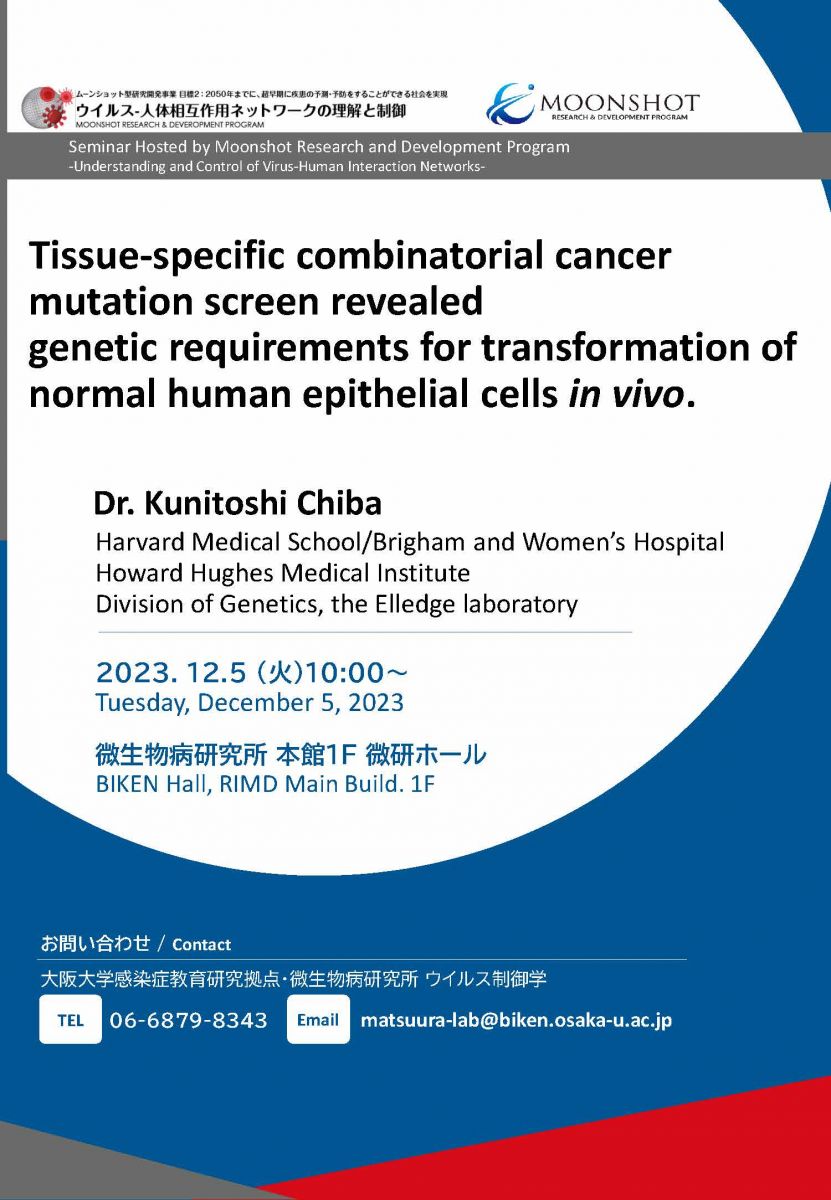12/5(火)Seminar -Dr. Kunitoshi Chiba -
2023年11月27日
イベント・セミナー
|
演 題と講演者 |
Tissue-specific combinatorial cancer mutation screen revealed genetic requirements for transformation of normal human epithelial cells in vivo.
Dr. Kunitoshi Chiba
Harvard Medical School/Brigham and Women’s Hospital Howard Hughes Medical Institute Division of Genetics, the Elledge laboratory |
|---|---|
| 日時 |
2023年12月5日(火) 10:00-11:00 |
| 会場 |
微研本館1F 微研ホール |
| Abstract |
Distinct mutations act as drivers in cancers originating from different tissue types. Of the hundreds of mutations that have been discovered across cancers, a relatively limited number are frequently observed in multiple cancer types. Consequently, these oncogenic drivers have been targeted for drug treatment. However, the efficacy of therapies that target the same oncogenic mutations varies between tumor types. Thus, it is important to understand the roles of oncogenic mutations in their tissue-specific biological contexts. The recent accumulation of cancer genome sequencing data has provided a more comprehensive picture of mutation frequencies, including those that are less frequent. Of these mutations, the number of key driver mutations that contribute tumorigenesis is relatively small. In many types of tumors, these major driver mutations accumulate in the early stages of tumorigenesis. Combinations of those driver mutations form diverse genetic backgrounds and complex phenotypes, including response to cancer therapy. However, the human cancer cell lines currently in use already have complex cancer genetic backgrounds, making it difficult to assess the combinatorial role of cancer driver mutations. Although the role of each driver mutation can be assessed using genetically defined normal human epithelial cells, in vivo transformation of human cells to date has relied on the use of potent viral oncogenes such as the SV40 large T antigen and HPV E6 E7 protein. Therefore, it is important to establish a high-throughput, genetically controlled system to investigate tumorigenesis with recurrent cancer driver mutations. To this end, I have developed a tissue-specific genetic screen system that achieves simultaneous expression of an oncogene (OG) and CRISPR mediated knock-out of two tumor suppressor genes (TSGs). I applied this tissue-specific combinatorial mutations library to investigate various aspects of cancer biology both in vitro and in vivo. In this seminar, I would like to present our recent findings on the genetic requirements for transformation of normal mammary epithelial cells (HMECs) in vivo. |
お問い合わせ/Contact
大阪大学感染症教育研究拠点/微生物病研究所 ウイルス制御学
#8343
- ホーム
- NEWS&TOPICS








